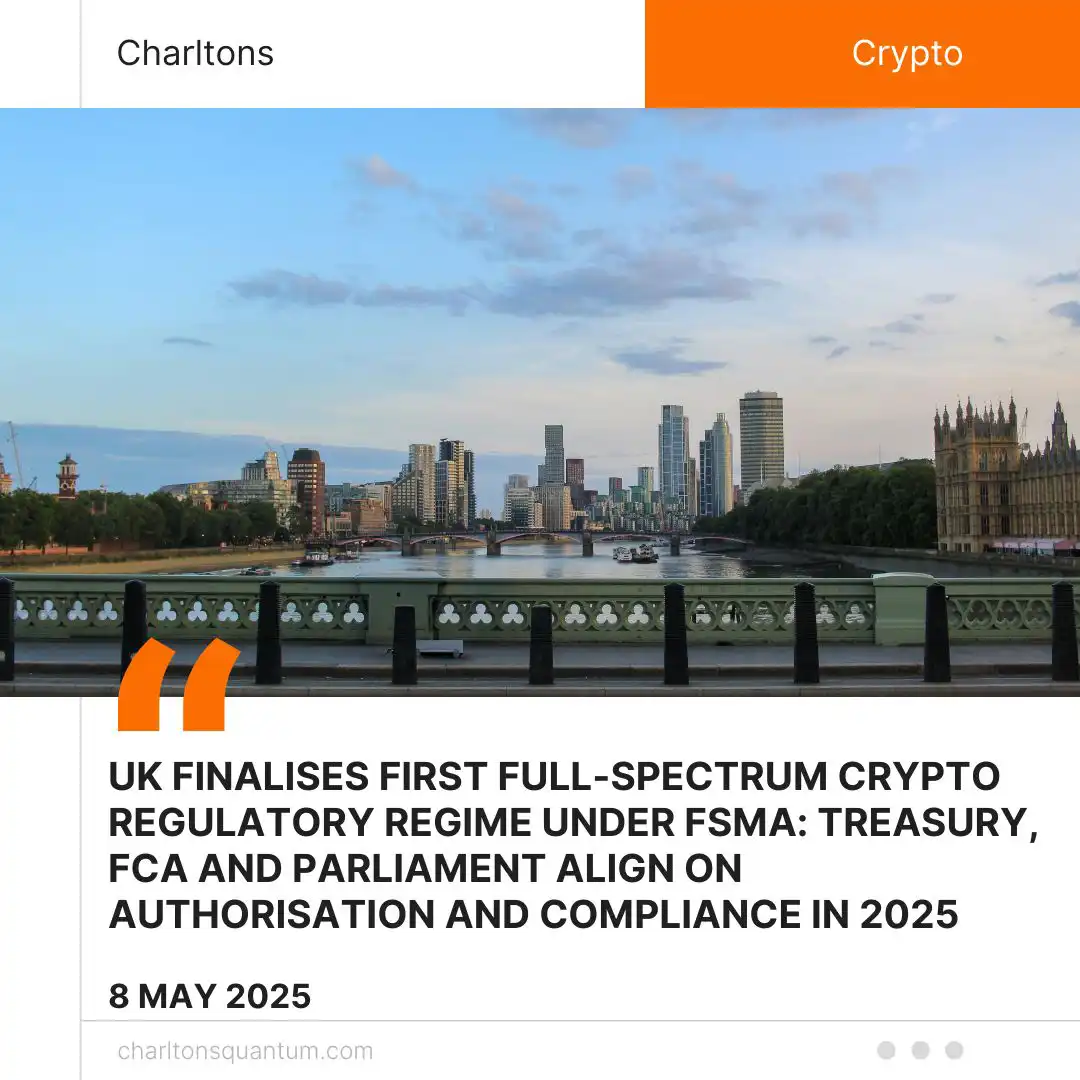
On 29 April 2025, the United Kingdom, taking forward its crypto roadmap, published a series of regulatory and policy framework to formally regulate cryptoasset activities under its principal financial legislation, the United Kingdom Financial Services and Markets Act 2000 (FSMA). In a coordinated regulatory release, HM Treasury laid before Parliament a draft statutory instrument, accompanied by an interpretive policy note, while the United Kingdom Financial Conduct Authority (UK FCA) followed with a detailed discussion paper. These instruments establish the UK’s first fully integrated, activity-based crypto regulatory regime, ensuring that crypto services such as custody, trading platforms, lending, stablecoin issuance, and staking will now fall within the UK FSMA perimeter.
The reforms are set out across three official documents: the United Kingdom Draft Financial Services and Markets Act 2000 (Regulated Activities and Miscellaneous Provisions) (Cryptoassets) Order 2025, published by UK HM Treasury; the Policy Note on the Future Financial Services Regulatory Regime for Cryptoassets (Regulated Activities), issued alongside the draft Order; and the United Kingdom Financial Conduct Authority Discussion Paper DP25/1: Regulating Cryptoasset Activities, released in May 2025. Together, these instruments articulate the statutory basis, interpretive objectives, and regulatory implementation plan for bringing cryptoasset activities within the UK’s principal financial regulatory framework under the United Kingdom Financial Services and Markets Act 2000.
The Draft RAO SI 2025 serves as the legislative foundation for this transformation. It amends the Regulated Activities Order 2001 to define and regulate seven key crypto-related activities, including issuing qualifying stablecoins, safeguarding digital assets, dealing as principal or agent, arranging transactions, operating trading platforms, and providing staking services. It introduces legal definitions for “qualifying cryptoassets” and “qualifying stablecoins” and adopts a phased commencement structure, giving regulators early powers to finalise supervisory rules while allowing firms time to adapt.
Complementing the statutory framework, the Treasury’s Policy Note clarifies the rationale, design, and boundaries of the new regulatory perimeter. It explains the government’s decision to regulate cryptoassets using FSMA’s existing architecture rather than creating a new standalone statute. The note confirms that UK-issued stablecoins will not yet be included in the Payments Services Regulations, although they may still be used for transactions. It also outlines functional exclusions, such as token minting, internal group rewards, and most decentralised finance (DeFi) models, unless a person can be identified as conducting business “by way of business” within the meaning of UK FSMA.
The UK FCA’s DP25/1 sets out the regulator’s supervisory expectations, authorisation standards, and planned rulemaking agenda. It outlines operational criteria for crypto trading platforms (CATPs), custodians, intermediaries, and staking service providers. Key proposals include prohibitions on conflicted proprietary trading, requirements for pre- and post-trade transparency, segregation of client assets, and layered regulation of staking services, including custodial and liquid staking models. The UK FCA confirms that authorisation will be required for both UK-based firms and overseas entities that serve UK retail clients. UK Crypto asset discussion paper previews upcoming consultations on prudential rules, Consumer Duty obligations, and a tailored market abuse regime for cryptoassets.
Taken together, these three documents form a harmonized regulatory framework for the regulation of cryptoassets in the UK. The statutory instrument defines the scope and perimeter, the policy note contextualises the government’s strategic choices, and the UK FCA discussion paper operationalises the future of compliance and enforcement. This framework aims to aligns with international standards from IOSCO and FATF, to offer legal certainty to firms, investors, and consumers by applying a familiar UK FSMA-based approach to digital asset services.
This publication is the latest step in the UK FCA’s ongoing Crypto Roadmap, offering a structured timeline for future regulatory consultations. With this coordinated rollout, the UK has transitioned from a registration-focused model under the Money Laundering Regulations to a bespoke authorisation regime under UK FSMA. Crypto firms targeting or operating within the UK must now evaluate their activities against the new regulated categories and prepare for licensing, conduct compliance, reporting obligations, and consumer protection measures under a law that treats cryptoassets with the same institutional seriousness as traditional financial instruments.
(Source: https://www.fca.org.uk/news, https://www.fca.org.uk/news/press-releases/fca-seeks-feedback-regulation-cryptoasset-trading-platforms)





